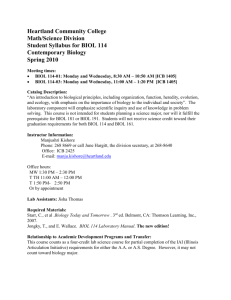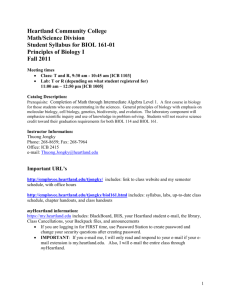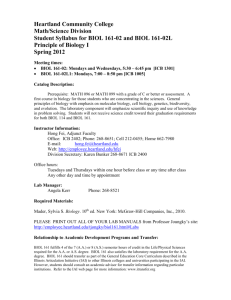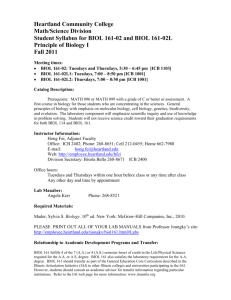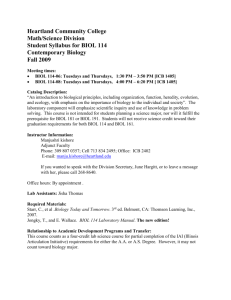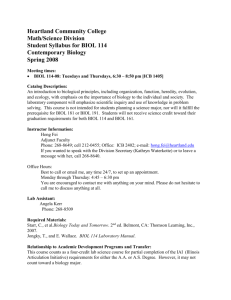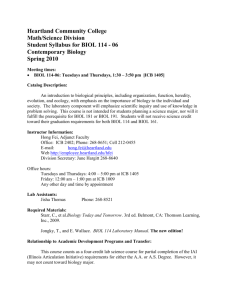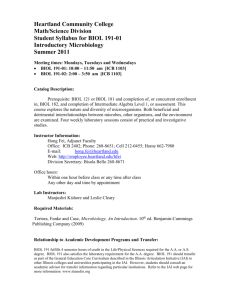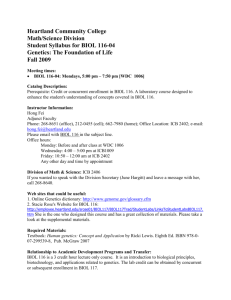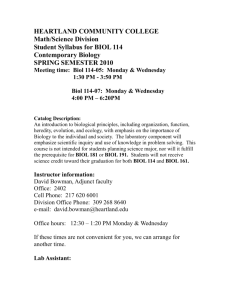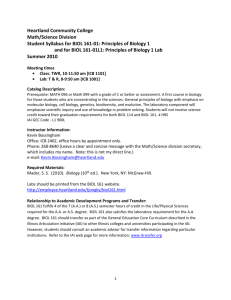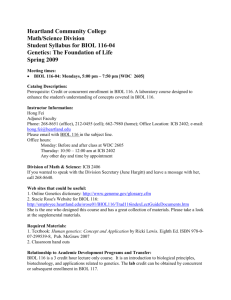BIOL 161-01 Fei (0211) - Heartland Community College
advertisement
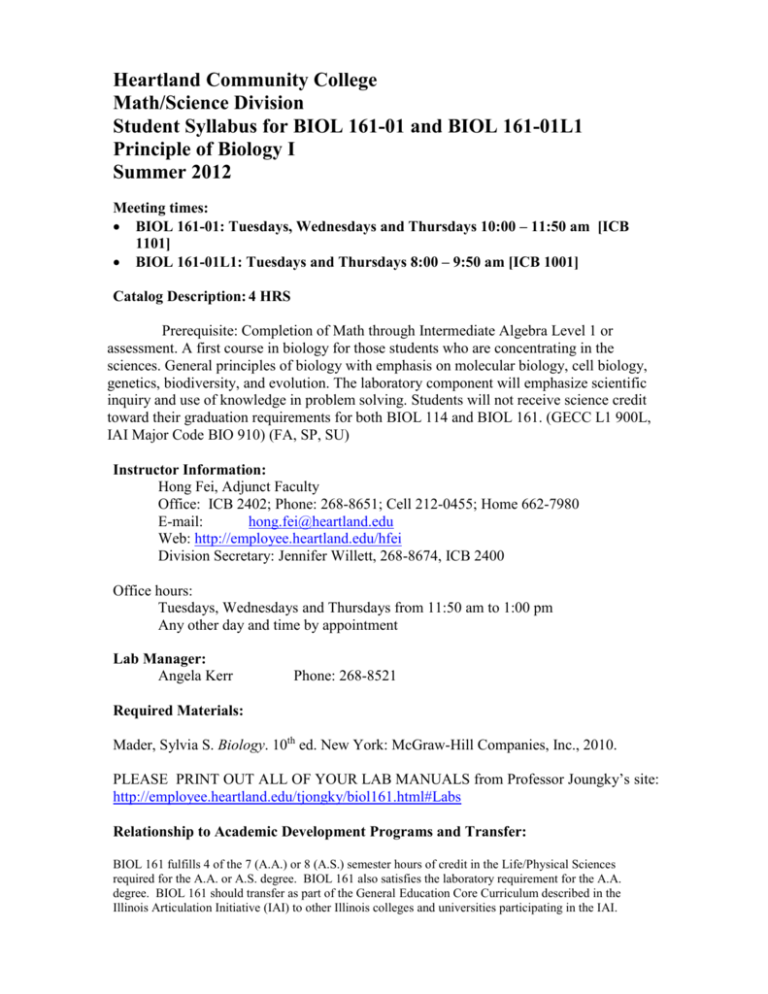
Heartland Community College Math/Science Division Student Syllabus for BIOL 161-01 and BIOL 161-01L1 Principle of Biology I Summer 2012 Meeting times: BIOL 161-01: Tuesdays, Wednesdays and Thursdays 10:00 – 11:50 am [ICB 1101] BIOL 161-01L1: Tuesdays and Thursdays 8:00 – 9:50 am [ICB 1001] Catalog Description: 4 HRS Prerequisite: Completion of Math through Intermediate Algebra Level 1 or assessment. A first course in biology for those students who are concentrating in the sciences. General principles of biology with emphasis on molecular biology, cell biology, genetics, biodiversity, and evolution. The laboratory component will emphasize scientific inquiry and use of knowledge in problem solving. Students will not receive science credit toward their graduation requirements for both BIOL 114 and BIOL 161. (GECC L1 900L, IAI Major Code BIO 910) (FA, SP, SU) Instructor Information: Hong Fei, Adjunct Faculty Office: ICB 2402; Phone: 268-8651; Cell 212-0455; Home 662-7980 E-mail: hong.fei@heartland.edu Web: http://employee.heartland.edu/hfei Division Secretary: Jennifer Willett, 268-8674, ICB 2400 Office hours: Tuesdays, Wednesdays and Thursdays from 11:50 am to 1:00 pm Any other day and time by appointment Lab Manager: Angela Kerr Phone: 268-8521 Required Materials: Mader, Sylvia S. Biology. 10th ed. New York: McGraw-Hill Companies, Inc., 2010. PLEASE PRINT OUT ALL OF YOUR LAB MANUALS from Professor Joungky’s site: http://employee.heartland.edu/tjongky/biol161.html#Labs Relationship to Academic Development Programs and Transfer: BIOL 161 fulfills 4 of the 7 (A.A.) or 8 (A.S.) semester hours of credit in the Life/Physical Sciences required for the A.A. or A.S. degree. BIOL 161 also satisfies the laboratory requirement for the A.A. degree. BIOL 161 should transfer as part of the General Education Core Curriculum described in the Illinois Articulation Initiative (IAI) to other Illinois colleges and universities participating in the IAI. However, students should consult an academic advisor for transfer information regarding particular institutions. Refer to the IAI web page for more information: www.itransfer.org Basic requirements and make-up policies: 1. Wireless devices and computer are not to be used in class room during lecture and discussions. 2. It is the responsibility of the students to check their “my heartland” email for any notifications. 3. It is allowed to make-up for quiz. It will be in the test center (new location!) only in the period of time between the quiz and the time next class meets. 4. Home works and class activities are allowed to be finished within the time of the given unit. 5. There is NO make-up for labs. 6. There is NO make-up for the Journal Club. 7. The student will complete most labs before leaving class. If a lab assignment has to be finished outside of class, the assignment is due the next class day. Only students who attend lab can finish the lab assignment. 8. In extreme cases (such as, documented severe illness, documented accident, or military duties) when a student must miss class for more than 2 weeks, the student must contact the instructor as soon as possible to discuss the best course of action. Incomplete Grade An Incomplete grade may be justified to a student if the student encounters extreme circumstances (e.g., serious illness, accident, death or serious illness in the immediate family) toward the end of the semester and is unable to complete the semester. The student must be in a position to pass the class if the Incomplete is given. The student must sign a form requiring him/her to finish the class by next semester. Required Writing and Reading Students must read the textbook to prepare for classroom activities. Students will write about biological news and answer questions on quizzes and labs. Academic Integrity Plagiarism is the presenting of others’ ideas as if they were your own. When you write a paper, create a project, do a presentation or create anything original, it is assumed that all the work, except for that which is attributed to another author or creator, is your own. Plagiarism is considered a serious academic offense and may take the following forms: Copying word-for-word from another source and not giving that source credit. Paraphrasing the work of another and not giving that source credit. Adopting a particularly apt phrase as your own. Using an image or a copy of an image without crediting its source. Paraphrasing someone else’s line of thinking in the development of a topic as if it were your own. Receiving excessive help from a friend or elsewhere, or using another project as if it were your own. [Adapted from the Modern Language Association’s MLA Handbook for Writers of Research Papers. New York: MLA, 1995: 26] Note that word-for-word copying is not the only form of plagiarism. The penalties for plagiarism may be severe, ranging from failure on the particular piece of work, failure in the course or expulsion from school in extreme cases. Academic Support Center Services http://www.heartland.edu/asc/ 1. Library The Library, located in the Student Commons Building at the Raab Road campus, provides Heartland students with a full range of resources including books, online journal databases, videos, newspapers, periodicals, reserves, and interlibrary loan. Librarians are available to assist in locating information. For more information please call the Library (309) 268-8200 or (309) 268-8292. http://www.heartland.edu/LIBRARY/index.html 2. Tutoring Services Heartland Community College offers tutoring in various forms at no cost to Heartland students at the Tutoring and Testing Center in Normal and at the Pontiac and Lincoln Centers. Tutors are available at convenient times throughout the week. Study groups are also available by request. For more information about services available at each location, please call the Tutoring and Testing Center in Normal at (309) 268-8231, the Pontiac Center at (815) 842-6777, or the Lincoln Center (217) 735-1731. http://www.heartland.edu/asc/tutor.html 3. Testing Services The Tutoring and Testing Center provides a secure testing environment for students who are enrolled in online, hybrid, and other distance learning courses; have a documented disability; or need to take a make-up exam. Testing accommodations for students having documented disabilities must be arranged by the student through the Office of Disability Services, and Testing Services will only administer make-up exams at the request of the instructor. Contact Testing Services at (309) 268-8231 for more information. http://www.heartland.edu/asc/testing.html 4. Open Computing Lab The Open Computing Lab provides free computing for HCC students at convenient times throughout the week. The computer lab is staffed by trained Lab Assistants and offers the use of approximately 70 computers, a scanner, a laser printer, and an electric typewriter. http://www.heartland.edu/asc/computerlab.html Documented disability If you have a documented disability and wish to discuss academic accommodations, please contact Anita Moore at 268-8249 or anita.moore@heartland.edu **Notice of Cancelled Class Sessions** Cancelled class sessions, for all HCC classes, will be listed under Cancelled Class Meetings in the A-Z Index and under Academic Information in the Current Students page on the HCC Web site. Go to http://www.heartland.edu/classCancellations/ to learn what classes have been cancelled for that day and the upcoming week. Be sure to check the last column, which might contain a message from the instructor. Course Objectives: Upon successful completion of this course, the student will be able to: 1. Connect concepts in a chapter and between chapters using concept maps. 2. Determine how the scientific method is used to solve everyday problems as well as scientific research problems. 3. Describe how the body uses the four major biological organic molecules (i.e., carbohydrates, proteins, lipids, and nucleic acids). 4. Identify the structure and function of organelles within eukaryotic and prokaryotic cells. 5. Illustrate energy utilization mechanisms, especially cellular respiration and photosynthesis, in living systems. 6. Differentiate between the importance of mitosis and meiosis. 7. Trace the history of DNA discovery and why gene expression is important. 8. Solve genetic problems. 9. Describe basic mechanisms of evolution. 10. Apply information learned to medical, environmental, and bioethical issues. 11. Provide examples of the relatedness of biology and chemistry. 12. Apply research skills and data collection techniques to complete laboratory exercises. 13. Use a computer to access information and to analyze data gathered during lab. Tentative Schedule: Week 1 June 5 - 7 Unit 1: Molecules and Cells Scientific Method – Chapter 1 Diversity of Life – Chapter 1 and 18.1 Biological Molecules – chapters 2 and 3 Lab 1: Basic Microscopy Lab 2: Life Characteristics Week 2 June 12 - 14 Unit 1: Molecules and Cells Cell – Chapter 4 Membrane – Chapters 5 Lab 3: Microbes Lab 4: Chemistry of Life Week 3 June 19 - 21 Unit 1 Test: June 19 Discussion of Test 1 Unit 2: Metabolism Thermodynamics – Chapter 6 Enzyme Dynamics Lab 5: Homeostasis Lab 6: Cellular Pathology Week 4 June 26 - 28 Unit 2: Metabolism Respiration – Chapter 8 Photosynthesis – Chapter 7 Lab 7: Cellular Respiration Lab 8: Photosynthesis Unit 2 Test: June 28 ----------------------------------------------------MID TERM----------------------------------------- Week 5 July 3, 5 July 4: No Class Discussion of Test 2 Unit 3: Genetics Discuss the test DNA / RNA /Protein Lab Mitosis & Meiosis – Chapters 9 and 10 Lab 9: Mitosis/Meiosis Lab 10: Blueprint of Life Week 6 July 10 - 12 Unit 3: Genetics Medelian Genetics – Chapter 11 Journal Club Preparation DNA Replication – Chapter 12 Lab 11: Mendelian Genetics Lab 12: Human Genetic Disorders Journal Club: July 11 Week 7 July 17 - 19 Unit 3: Genetics Gene Expression – Chapter 12 Gene Expression Regulation, Biotechnology – Chapter 13 and 14 Lab 13: DNA Detective Unit 3 Test: July 19 Week 8 July 24 - 26 Discussion of Test 3 Unit 4: Evolution Hardy – Weinberg Equilibrium Activities - Chapter 15 and 16 Sexual Selection Activities – Chapter 17 The Final Exam and Deadline for Everything: July 26 Discussion of final exam: July 31 Unit 1 - Molecules and Cells: 2 Weeks Unit 2 – Metabolism: 2 Weeks Unit 3 – Genetics: 3 Weeks Unit 4 – Evolution: 1 Weeks Grading: Each Unit = 100 Points (Test and Thinking Questions) / Total = 400 Points Journal Club Presentation = 100 Points Each Lab = 10 Points / Total = 130 Points Total Possible = 630 Total grade = Points Earned / Total Possible E. g. If you had earned 590 out of the 630 possible points, your final grade would be 590 / 630 = 94%. Your final letter grade would be an A. Safety Rules for Biology Lab 1. Emergency shower and emergency eye wash are located at the side of classroom. 2. Fire extinguisher is located in the classroom. Familiarize yourself with the location. 3. Safety information about chemicals used in labs, including chemical storage, poison control and treatment, is on file and available in binder in the storage room. These papers are called Material Safety Data Sheets (MSDS) that are required by law to be available for inspection by users. 4. Eye protection, gloves, aprons will be provided when exercise necessities; however, they are available at all times upon request. 5. Always ware gloves when handling chemicals. 6. Dispose hazardous material in special containers. 7. Dispose sharps (needles, blades) in sharp container. 8. Dispose bacteria culture in biohazard bags. 9. Rinse with copious amount of water when chemicals spilled on skin. 10. Handling vaporous material in fume hood. 11. Clean up work area so next time or next person will not touch chemicals or microbes. 12. Report accident immediately. The Journal Club In biology, we encounter a lot of facts, concepts and theories. It makes little sense to memorize facts without understanding how they were discovered, why the theories are correct, and how the concepts are useful. It is important that at the college level, students read and present articles from original, peer reviewed journals and understand them as the recognized source of information for scientists or scientific community at large. 1. Objectives Students will re-trace steps in the process of scientific inquiries. 2. Procedure: At the beginning of unit 3, you will receive a series of scientific journal articles that are simplified version of significant discoveries. Because they are all discoveries that revolutionized biotechnology and medicine, they will give you ideas of “how” and “why” behind theories. Because they are simplified, technical details are avoided. All students will be given articles and a question sheet to read and answer. However, each group of students will have an article to present. They will present to the class the following aspects of the article. 1) Why the research was done? What problem they hoped to solve? What background work had been done? 2) Describe the methods. Why did they choose this particular method? What was the breakthrough in this methodology? 3) Explain the results. If there are data, tables, or figures, you are expected to explain them to the audience. You should show the data as if you were presenting them to the scientific community, using visual aids. 4) What were the conclusions? What was the significance of this work? Are there potential applications in research and medicine? 5) Critique the research. What is the next step if you were the one who finished the study? 3. Evaluation Students are encouraged to discuss with instructor before the presentation. Total point of 100 can be earned towards the final grade. Presentation: Concise and accurate 20% Content: Include the above aspects 40% Discussion: Answering questions from audience 20% Worksheet: Answer questions concerning the research 20%
